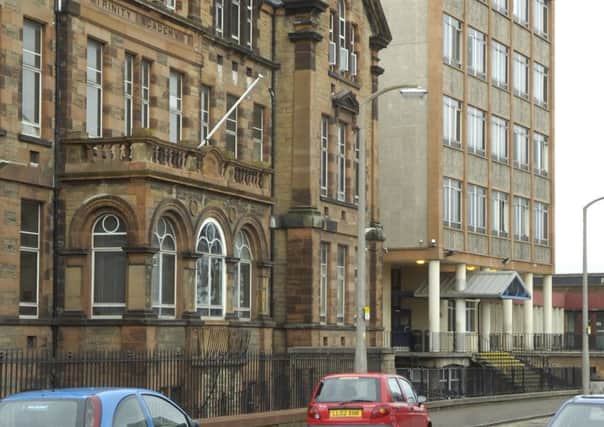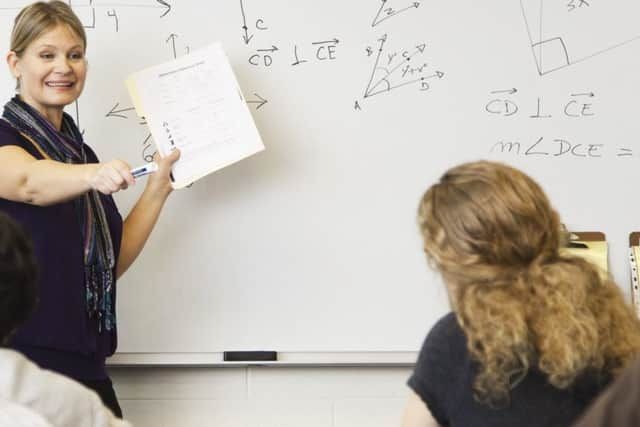Insight: Education crisis '“ do the maths, school chiefs


But the articulate and personable “spokesmen” for the school were in fact teenagers Ruairidh Gilchrist, the school’s vice-captain, and Jack Liddell, head boy.
The school hit the headlines on Wednesday when The Scotsman broke the story that head teacher Brian Paterson had resorted to writing to parents asking them for help after he had been unable to fill two maths teaching vacancies, despite advertising the posts twice.
Advertisement
Hide AdAdvertisement
Hide AdRuairidh and Jack manfully and articulately told BBC Scotland’s political correspondent Glenn Campbell that the problem was “something we’re coping with, coping with it well, it’s a national problem and something which other schools in Edinburgh are dealing with”.


A request by Scotland on Sunday to Edinburgh City Council to speak to Mr Paterson for today’s ‘Insight’ was turned down. Which is a great pity because the inside track from Mr Paterson, head of one of the best state secondary schools in the city, would surely get to the heart of the matter, which is, simply: what is the reason that mainstream schools in Edinburgh, our attractive capital, cannot recruit enough maths teachers?
Nevertheless the issue of Trinity Academy and schools across Scotland seemingly being unable to recruit enough teachers to the key STEM (science, technology, engineering and maths) subjects was raised at First Minister’s Questions the day after the Trinity Academy story appeared, with Scottish Conservative leader Ruth Davidson clashing with First Minister Nicola Sturgeon and warning of “crippling” teacher shortages.
It didn’t help that all this happened on day three of the Scottish Government’s inaugural Maths Week which saw Education Secretary and deputy First Minister John Swinney tweeting a daily maths challenge problem aimed at making maths fun and “explored and celebrated throughout Scotland”.
In March the issue of the shortage of STEM teachers became high-profile when the head teacher at Blairgowrie High school wrote to parents asking those who had a qualification in maths and were registered with the General Teaching Council for Scotland to come forward and help teach maths while the school tried yet again to recruit those qualified in the subject.


It proved to be a major embarrassment for Swinney in whose Perthshire North constituency the school is situated.
There were suggestions Blairgowrie’s rural location could be a deterrent with teachers unwilling to go through the upheaval and expense of relocating, or new teachers reluctant to leave behind the attractions of the big cities.
However, Scotland is currently 680 teachers down with recruiting STEM graduates a particular problem. In February the Scottish Government launched the ‘Teaching Makes People’ recruitment campaign to target the 20,000 STEM students graduating from Scottish universities each year. The campaign also saw widespread advertising at Scotland’s main railway stations and on local radio aimed at those thinking of changing careers.
Advertisement
Hide AdAdvertisement
Hide AdLast year also saw a scheme offering ring-fenced teacher training places to nearly 20 former oil and gas industry workers. But recent figures show around half have since left the course or returned to work in the oil industry.
The maths teacher “equation” is straightforward to explain but also hits on the deeper political and systemic problems from continual policy changes affecting a profession once ranked alongside law and medicine as a desirable, highly respected profession.
As Seamus Searson, general secretary of the Scottish Secondary Teachers’ Association, says, maths and science graduates can almost name their price. They are in big demand with global IT, tech and financial companies offering lucrative salaries and opportunities.
“Schools can advertise for maths teachers but not get anyone applying, or those who do want flexible working when that doesn’t suit the school.
“John Swinney said education is important but this is not reflected in what teachers are paid. It’s hardly a big surprise that with the pay levels and limited promotion prospects STEM graduates will look at other options.
“The starting salary for a maths teacher as a probationer is £22,416. The next year that goes up to £26,895, with the top of the scale being £37,763.
“Those starting out will be looking at living costs like rent and property prices and may decide they can’t afford to live in somewhere like Edinburgh and give it a wide berth.
But they have skills that are highly marketable and if they go into businesses in the private sector after a few years they’ll be on £44,000 upwards.
Advertisement
Hide AdAdvertisement
Hide Ad“After a teacher reaches the top of the scale the only option is to get a promoted post, but these have gone down considerably over the past few years, and are unattractive to many people because of the amount of responsibility and admin being heaped on them.
“The promoted post may be as head of a department covering a range of disciplines when they want to stay in their own subject.
“So they might start thinking ‘what’s happening to keep me here? I’m not being valued’ and also be at a stage in their lives when they want to move up the property ladder, have family responsibilities and see a way out by joining a big business.”
A further disappointment to the teaching profession was the scrapping of the Chartered Teachers scheme which saw teachers rewarded with increased pay if they undertook advanced study.
A report by the Organisation for Economic Co-operation and Development showed teachers in Scotland and England earned less in real terms in 2015 than a decade before. This was in contrast to a number of countries where average pay was rising.
Searson says once the maths and science graduates are in the teaching system they experience the same difficulties facing the vast majority of their colleagues.
“Looking at just one area which there is so much debate about – the curriculum for excellence. It was meant to give teachers the freedom they need to get pupils up to certain levels.
“But over the past few years schools have been turned into ‘exam factories’ and the joy is going out of teaching.
Advertisement
Hide AdAdvertisement
Hide Ad“The profession has been devalued and the faults of society are being put on the shoulders of teachers.”
But just like when the Queen asked academics at the London School of Economics in 2008 why no one had seen the financial crisis coming, many Scots are wondering why no-one predicted the present teacher recruitment crisis. Searson puts the current situation down to the “shortsightedness” of government.
“When there was a surplus of teachers they cut back on teacher training places. But they failed to anticipate the number leaving the job. They didn’t take into account natural wastage, retirement and teachers going part-time. Now there are teachers who when they reach the age of 55 just want out because they can’t take it any more and take a reduced pension.”
Dr Niall Dodds, a lecturer in mathematics at the University of Dundee, is a member of the Learned Societies’ Group whose members include prestigious bodies such as the Royal Society of Edinburgh, the Institute of Physics and the Edinburgh Mathematical Society, established in 2012 due to concerns over changes to STEM education in Scotland’s schools.
The group recently identified six key factors in STEM teacher recruitment and retention in Scotland and concluded: “In essence, raising teachers’ professional status is key to addressing teacher shortages, with teachers’ professional status and supply being fundamentally linked.
“If the status of the profession was to be raised and teaching was to be well-marketed to undergraduates, this would undoubtedly attract a larger number of high quality, subject-specialist candidates, and improve retention. High-quality initial teacher education and career-long professional development, including that which is subject-specific, are key components.”
Dodds said he believes the shortage of STEM graduates – with sectors such as banking and finance also suffering graduate shortages in this area – has its origins when children are very young.
“Maths is seen as being a difficult subject and sometimes as not very useful. But if schools promoted the job and career prospects at an earlier stage in children’s school careers it could boost the numbers taking it up later on. They could study any STEM subject at university from physics to engineering and still be maths teachers.
Advertisement
Hide AdAdvertisement
Hide Ad“They should be told that if you study an ‘easy’ subject, in the arts for example, there could be less job opportunities .
“To get engaged with maths you have to understand it. Some pupils have a natural ability while others have to work at it. But it’s a vicious circle – if there’s a lack of maths teachers young people won’t be motivated and won’t fulfil their potential. Quite simply they need to get more kids into universities to get more STEM graduates but with such a wide range of interesting jobs available to them teaching is struggling to compete.”
However, Dodds added that a school teaching career was not for him. “Thinking personally, would I be a school maths teacher? No. Because of the lack of discipline.
“Teaching in some schools is basically crowd control. What proportion of the time is teaching maths and what proportion is crowd control?”
Larry Flanagan, general secretary of the Educational Institute of Scotland, the country’s biggest teaching union, described the Scottish Government’s statement that it had increased the number of teacher training places as “sleight of hand” and said it did not mean shortages would be resolved.
“Teacher training colleges are not filling their quotas for certain subject areas. The places for specific subjects are to avoid having unemployed graduates later on. If not enough maths graduates apply the place cannot go to someone who wants to be a history teacher.
“Nicola Sturgeon said there had been an increase of 231 probationer teachers this year compared to last year. But if you actually need more teachers because of a demographic spike in the number of pupils and the pupil roll goes up, these are not “extra” teachers but pro-rata.
“I think the Scottish Government is being too cautious on the number of teaching training places they fund and are also under-estimating the ‘burn-out factor’ among current teachers.”
Advertisement
Hide AdAdvertisement
Hide AdFlanagan said while he welcomed initiatives such as Holyrood’s Attainment Challenge and Pupil Equity Fund, the government had failed to anticipate, and factor in, the demand by schools for the money to be used to employ more teachers. Such staff were not necessarily there for the taking.
The Scottish Attainment Challenge Funds involves £750m being targeted at fighting the poverty-related attainment gap and goes to pupils in primary schools in the nine most deprived local authorities in Scotland, along with 72 other schools in poorer areas. It also covers 133 secondary schools.
Notwithstanding all the debate around education, which Flanagan says should not be used as a “political football” by politicians, he said he would not hesitate to recommend teaching as a career.
“We’re not opposed to looking at alternative routes into teaching but we are cautious about some fast-tracking ideas such as Teach First which are gimmicky. I think teaching is a brilliant profession and would urge people, despite all the challenges, to take it up.”
However, Flanagan also highlighted how the new wave of teacher graduates are party to a contemporary way of thinking and working and don’t necessarily see teaching as something they will do until they retire.
“Increasingly we are seeing a discrepancy between the number qualifying and those going into the profession. There has been as much as a 10 per cent drop-off.
“Usually graduates are desperate to get their first job but now many are heading to places like Dubai and using the “golden goodbye” when they leave as a deposit for their first flat.
“They are setting off on gap years, having world adventures using their teaching qualification as part of their funding model. They don’t see teaching as a life-long career.”